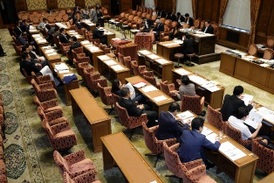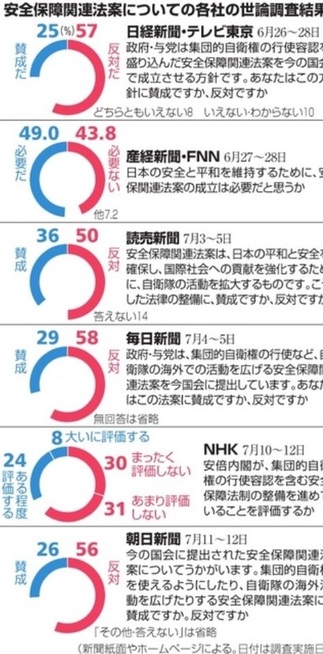 www.asahi.com
www.asahi.com Ishiba Shigeru added his two cents to the debate earlier in the week when he was quoted as saying that public opinion polls have led him to conclude that the people don’t understand what the government is aiming at with its laws. They are, according to Ishiba, too abstract for people to grasp, lack a founding in reality, and require further explanation in order to bring the population around to the government’s way of thinking (J).
Certainly the question of security law reform has reached as far as the local and prefectural government level, with the Mainichi Shimbun revealing on Wednesday that 405 documents related to debate about the security law reforms have been received by the Diet from prefectural, city, town, and village assemblies. Of these, 393 assemblies have voiced their opposition to the proposed reforms or demanded further debate on their content, while only 12 have voiced their support for the Abe government’s proposals. What is more interesting is that in the case of 114 assemblies, a majority of the LDP members in those assemblies have approved their assemblies’ objections to the federal government’s proposals (J).
What you have, in other words, is a merging division between regional LDP members and their federal counterparts over the issue of security laws. On that note, it might not be a surprise, then, that Ishiba would make his concerns known about the current Diet process for the laws given that he is the Minister for Regional Development (solidifying his support base before the laws are rammed through the Lower House might be an insurance policy against any sharp downturn in support for the LDP and PM Shinzo Abe).
Even the Japan Innovation Party couldn’t persuade their fellow conservatives within the LDP and New Komeito to consider an alternative proposal to place regional limits on the operating zones for the SDF (J). Hence at midday on the 15th of July, the security laws were passed by a specially convened committee of the Lower House, with expectations that they will be passed in a session of the Lower House on the 16th and then sent to the Upper House (J). The LDP-New Komeito coalition does not command an overwhelming majority in the Upper House, yet under the 60 day rule of the Diet, if legislation introduced from the Lower House is not approved following 60 days of debate it will automatically be passed into law.
So PM Abe may yet get his laws passed through the Diet, thereby achieving the most significant transformation of Japan’s security posture since his grandfather renewed the US-Japan Security Treaty in 1960. Yet this may come at a cost for Abe, just as it did for his grandfather.

 RSS Feed
RSS Feed